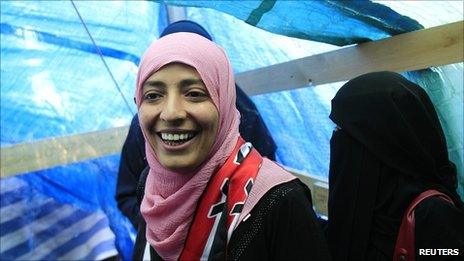Egypt denies entry to Nobel Peace winner Tawakul Karman
- Published

Yemeni Nobel Peace Prize winner Tawakul Karman has been denied entry into Egypt after she landed at Cairo airport "for security reasons", officials say.
Ms Karman, the first Arab woman to win the prize, was held on arrival and reportedly told to fly on the same plane back to the United Arab Emirates.
She has voiced support to Muslim Brotherhood followers, calling Mohammed Morsi's ousting "undemocratic".
Separately, US diplomat William Burns continued mediation talks in Cairo.
The deputy secretary of state extended his visit to meet Egyptian army chief Gen Abdul Fattah al-Sisi and a pro-Morsi delegation on Sunday. He earlier met members of Mr Morsi's Muslim Brotherhood and its political party, as well Foreign Minister Nabil Fahmy.
Mr Burns's visit is the latest in a flurry of US and EU diplomatic activity to mediate a peaceful resolution to the crisis, which, since 3 July, has led to the deaths of more than 100 Morsi supporters.
'Solidarity' with Morsi
Ms Karman's Twitter feed said on Sunday that the activist had been detained at Cairo airport and prohibited from heading to one of the main protest camps set up by Morsi supporters in the east of the capital, Rabaa al-Adawiya.
While Egyptian security sources did not give a reason for Ms Karman's ban, Mena state news agency referred to her "solidarity" with supporters of the deposed Egyptian president.
A prominent human rights activist and member of Yemen's leading opposition Islah party, Tawakul Karman was awarded the Nobel Prize in 2011.
She is widely considered a symbolic figure in the 2011 anti-government Yemen uprising.
Egypt was plunged into a political crisis last month after the army's overthrow of Islamist Mohammed Morsi, in response to anti-government protests that took hold of the country.
His followers have vowed to keep protesting until he is reinstated as president.
Meanwhile Gen al-Sisi met an influential group of Salafist clerics who have made several appearances at the Rabaa al-Adawiya protest camp in Cairo in recent days.
According to an army statement, he told the clerics a peaceful solution could be reached if all sides rejected violence.
One of the attendees, Sheikh Mohammed Hassan, said that the army chief had promised not to "forcibly disperse the sit-ins", speaking in a televised sermon at Al-Hossari Mosque.
In return, Gen al-Sisi reportedly demanded that the leaders of the sit-ins tone down their speeches and remain peaceful.
'Security threat'
However, the preachers were heavily criticised by Morsi loyalists for taking part in the meeting - they say nothing short of Mr Morsi's reinstatement will end their protests.
Tensions have heightened over the pro-Morsi camps in recent days, with the military-backed government issuing a series of warnings to protesters to disperse or face removal by force.
And in a move which could inflame the situation further, an Egyptian court has set 25 August as the trial date for the leader of the Muslim Brotherhood, his two deputies and three other senior members over allegations of involvement in protesters' deaths.
Mohamed Badie and his deputy, Khairat al-Shater are accused of complicity in the killing of eight protesters outside the group's headquarters in Cairo at the beginning of July.
Egypt's top security body, the National Defence Council, also warned on on Sunday that a time limit should be imposed on the search for a peaceful solution.
Last week, the government described the continued sit-ins as "a threat to national security".